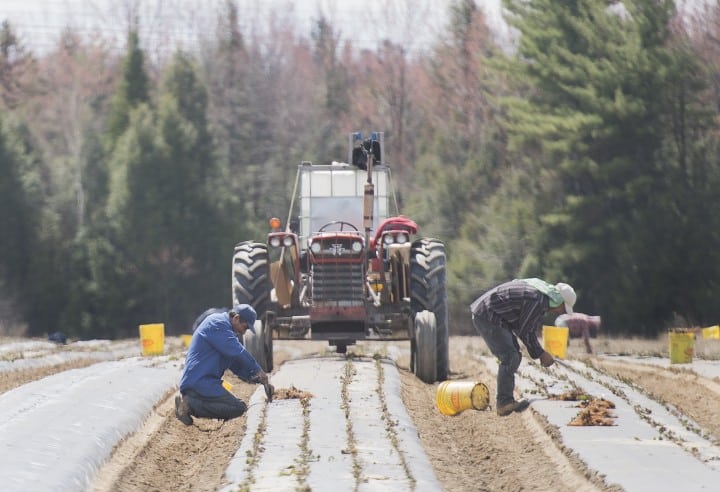What the lack of migrant workers due to COVID-19 has meant for farming in Ontario
Published December 14, 2020 at 9:45 am

The ongoing COVID-19 pandemic has impacted ‘normal life’ in almost every way possible.
The world of farming and agriculture has had to navigate a particularly challenging set of obstacles created by the pandemic in an effort to continue to provide their essential goods and services to the public at large.
While COVID-19 has impacted this industry in many ways one of the most noticeable effects has been the lack of migrant workers on farms.
But what exactly has the lack of migrant workers meant for farming in Ontario?
Delayed labour
Dusty Zamecnik, Production Manager at EZ Grow Farms Limited (a farm in Norfolk with a focus on high bush blueberries, nursery strawberry plants, and tomatoes), normally hires anywhere from 13 to 90 migrant workers. These workers have a maximum time limit (under SAWP – Seasonal Agriculture Worker Program) of eight months before they have to return home. Zamecnik said that on EZ Grow Farms, there is enough work to support around 20 workers from about February to the middle of November, however, this is longer than the eight-month timeframe.
Regardless, as a result of the pandemic, timing has been an obstacle Zamecnik has had to tackle to get the employees he needs to get the work done.
“We got our first flight of Jamaican men in and then, two weeks later, our Trinidad men were set to fly,” Zamecnik said back in September. “They were set to land at noon, on the Wednesday, when 12 hours prior, our Prime Minister did the federal quarantine.”
As a result, those Trinidad workers did not arrive at Zamecnik’s farm during his busy season meaning some farming processes were delayed.
“What happened is, that blueberry you eat in July, the bush need[ed] to be pruned,” Zamecnik said. “There needs to be treatments on the field, and everything is such a timely thing. Same sort of deal with a strawberry plant. There’s a lot of processes that need to happen in a very timely manner. And because we didn’t have the amount of people [we needed] in the bulk of the heavy season, obviously in the springtime, all those processes got delayed, which eventually led to delays now, which is why we have all the people, but we can only push nature so much.”
Zamecnik now has 100 per cent of his labour but, in general, he said Ontario farmers may be feeling the ramifications caused by loss of or delayed labour for years to come.
“The other thing is, for true perennial crops, apples, blueberries, anything like that, the pruning you do this year affects the crop for next year,” Zamecnik noted. “So, we’re going to be feeling the effects of loss of labour this spring, next year as well. There’s going to be an interesting food dynamic for a couple of years to come.”
Loss of crop and food
Michelle Inksetter, Co-Owner of Carluke Orchards, an apple farm and bakery, has also noticed some impacts COVID-19 has had on farming – one being the loss of crop due to the lack of migrant workers.
Although Carluke Orchards has not been directly affected by a lack of migrant workers, Inksetter has noticed the problems this has caused for other farmers.
“Some farmers have had huge problems,” Inksetter said in an email. “The asparagus farmers were in the midst of harvest when this pandemic started and a lot of crop was wasted which is a huge shame.”
Inksetter noted that other apple farmers have had problems with both getting and maintaining labour.
“We haven’t been impacted, we are fortunate enough to be able to hire local help, we’ve had the same picking crew for years and they’re a great group,” Inksetter said.
“The honest answer is that they’re amazing workers, and they know what they’re doing,” Inksetter said. “It’s really hard to find people willing to put in this kind of labour close to home, we’ve heard of farms trying to hire local labour and very few can last long doing this work. We know from our experience, having the same crew every year makes a huge difference in productivity, efficiency, and quality of work. They know what they’re doing, where to go, and how to handle our specific crop. It’s not easy to replace that kind of experience.”
Zamecnik also commented on the importance of migrant workers: “Their toolbox of abilities is insanely large. That’s why I will always be an advocate for the fact that [they] are skilled labor. What they do requires a plethora of knowledge and consistency, efficiency, and abilities.”
Back in May of this year, it was announced that Justin Trudeau pledged $252-million towards the country’s agriculture and food industries. Just one month later, in June, it was announced that Ontario specifically would be implementing a three-point plan to lower the risk of COVID-19 on farms.
This plan included expanding on-site testing at agri-food businesses and community assessment centres, ensuring temporary foreign workers have access to employment benefits and protections and issuing new public health guidance that allows positive asymptomatic workers to continue working as long as they follow measures to minimize the risk of spreading the virus.
COVID-19 has hurt many industries and it’s safe to say the farming industry is no exception, but Zamecnik believes that the provincial government has done a solid job when it comes to supporting farmers.
“I think our provincial government, from an optics standpoint, has done a great job in supporting the seasonal agricultural workers as well as farmers through this,” Zamecnik said.
“When the outbreaks were happening in Leamington and here in Norfolk, and around different farms, they went to bat for us and that meant a lot to all of us that were in the thick of it.”
insauga's Editorial Standards and Policies advertising





